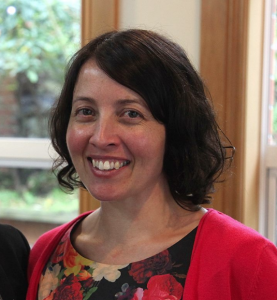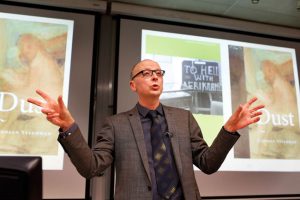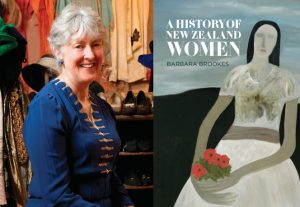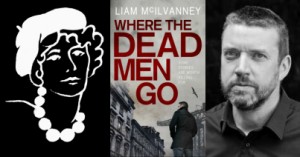Ernest Scott Prize 2016
The shortlist for the Australian Historical Association’s prestigious Ernest Scott Prize has been announced. On the list is the Centre’s director, Professor Tony Ballantyne, for his book Entanglements of Empire: Missionaries, Māori and the Question of the Body (Auckland University Press, 2015). The Ernest Scott Prize is awarded to the book that has made the most distinguished contribution to Australian or New Zealand history or the history of colonisation.
The judges describe Entanglements of Empire as “a smart, engaging and intelligent new work, which carefully blends New Zealand historical research with new theoretical readings inspired by international scholarship. Pushing disciplinary boundaries, its novel approach in reading the early Missionary-Maori dynamic in a new light, makes this book a new spin on an ‘old’ topic. Employing new frames of reference, guided by a focus on spatial interaction and physical embodiment, this book will invite further re-readings of the early colonial encounter period in New Zealand. Elegantly written, grounded in solid primary research, Entanglements of Empire is focused on re-thinking the history of early colonial New Zealand.”
The winner will be announced at the Kathleen Fitzpatrick Lecture, University of Melbourne, on 26 April.
Congratulations Tony, and good luck!
Ballantyne wins W H Oliver prize
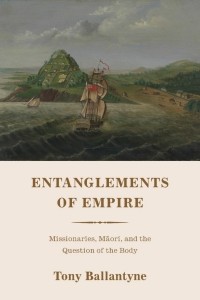 Congratulations to Centre director, Professor Tony Ballantyne, for winning the W.H. Oliver prize. This was the first time the prize has been awarded, for the best recent book on any aspect of New Zealand history. Tony’s book, Entanglements of Empire: Missionaries, Māori, and the Question of the Body, published by Auckland University Press, was the winning entry, announced yesterday at the New Zealand Historical Association conference in Christchurch. The books of two other CROCC members, Tom Brooking’s Richard Seddon: King of God’s Own and Angela Wanhalla’s Matters of the heart: A History of Interracial Marriage in New Zealand were shortlisted, as was that of Melissa Matutina Williams, Panguru and the City: Kāinga Tahi, Kāinga Rua.
Congratulations to Centre director, Professor Tony Ballantyne, for winning the W.H. Oliver prize. This was the first time the prize has been awarded, for the best recent book on any aspect of New Zealand history. Tony’s book, Entanglements of Empire: Missionaries, Māori, and the Question of the Body, published by Auckland University Press, was the winning entry, announced yesterday at the New Zealand Historical Association conference in Christchurch. The books of two other CROCC members, Tom Brooking’s Richard Seddon: King of God’s Own and Angela Wanhalla’s Matters of the heart: A History of Interracial Marriage in New Zealand were shortlisted, as was that of Melissa Matutina Williams, Panguru and the City: Kāinga Tahi, Kāinga Rua.
.
Three Centre members finalists for best History book award
Professor Tony Ballantyne, Professor Tom Brooking, and Dr Angela Wanhalla, are three of the the four finalists for the inaugural W.H. Oliver Prize for best book on New Zealand history, to be awarded next week at the New Zealand Historical Association conference. The books are Tony Ballantyne, Entanglements of Empire: Missionaries, Maori, and the Question of the Body (AUP); Tom Brooking, Richard Seddon, King of God’s Own: The Life and Times of New Zealand’s Longest Serving Prime Minister (Penguin); and Angela Wanhalla, Matters of the Heart: A History of Interracial Marriage in New Zealand (AUP).
All three finalists are academics within the Department of History and Art History, but also members of the Centre for Research on Colonial Culture. For the full story, read the latest article in the Otago Bulletin Board.
Centre member wins Ernest Scott Prize 2015
Congratulations to Professor Tom Brooking whose Richard Seddon, King of God’s Own: The Life and Times of New Zealand’s Longest-Serving Prime Minister was co-winner of the Ernest Scott Prize for 2015, with Alan Atkinson’s The Europeans in Australia, Vol 3: Nation. Tom is the second CROCC member to have won this prize awarded for “the most distinguished contribution to the history of Australia or New Zealand or to the history of colonisation”. Angela Wanhalla won in 2014, and Centre director, Tony Ballantyne, was shortlisted in 2013. Click here for the publisher’s info on Richard Seddon.
Liam McIlvanney wins Ngaio Marsh Award
Great news about CROCC member, Professor Liam McIlvanney.
Press Release by Craig Sisterson: craigsisterson@hotmail.com
An exceptional thriller entwined with national and workplace politics, sectarian warfare, and the changing face and influence of the newspaper industry has won University of Otago Professor of Scottish Studies Liam McIlvanney the prestigious Ngaio Marsh Award for Best Crime Novel.
Dunedin-based McIlvanney was announced as the winner, for his “fascinating, brilliant, and challenging” novel WHERE THE DEAD MEN GO, before a packed house at the conclusion of the lively Great New Zealand Crime Debate event at the WORD Christchurch Writers & Readers Festival on Saturday 30 August. “In a year where we had our strongest, deepest, and most diverse long list ever, and four truly fantastic finalists, WHERE THE DEAD MEN GO got the nod for its terrific, page-turning storytelling powered by superb prose, fascinating characters, and an evocative sense of place,” said Judging Convenor Craig Sisterson. “It’s the kind of book that lingers in your mind beyond the final page.”
In WHERE THE DEAD MEN GO, Glasgow stands on the precipice: of the Commonwealth Games, a national vote on Scottish independence, and an explosive rekindling of a brutal gangland war. Gerry Conway is a jaded, jobbing journo, the golden child fallen, clinging to the coat-tails of his former protégé, Martin Moir. When Moir’s body is discovered as a big story breaks, Conway steps into his shoes; a very dangerous place, as gangsters, politicians, and other predators swirl around.
The judging panel, consisting of crime fiction experts from New Zealand, Australia, and the United States, called WHERE THE DEAD MEN GO “a thought-provoking novel with very real characters and a fascinating, complex plot”. McIlvanney puts a lot into this book: the state of the news media, what it takes to be a good reporter, politics, family life, and even a New Zealand connection, said one judge. “Excellent writing makes it all fit together very nicely indeed.” Conway was described by the judges as “an unlikely hero perhaps, as the mainstream media around the world are going down the gurgler… he keeps digging away like a real reporter should, even when his bosses are less than supportive.”
The Ngaio Marsh Award for Best Crime Novel, established in 2010, is named for Dame Ngaio Marsh, who is renowned worldwide as one of the four Queens of Crime of the Golden Age of Detective Fiction. Dame Ngaio published 32 novels featuring Inspector Roderick Alleyn between 1934 and her death in 1982. With sales in the millions, and her books still in print to this day, Dame Ngaio is one of New Zealand’s most globally successful authors. Dame Ngaio’s closest living relative, John Dacres-Manning, gave his blessing for the New Zealand crime writing award to be named in her honour, saying that “I know that Dame Ngaio would be so proud… to know that her name is associated with the award”.
In addition to the award itself, McIlvanney, who is the son of famed Scottish novelist and poet William McIlvanney, wins a set of Dame Ngaio’s novels, courtesy of HarperCollins, and a cheque for $1,000 from the Christchurch Writers’ Festival Trust.
Dr Angela Wanhalla wins Ernest Scott Prize
At the Australian Historical Association conference in Brisbane last night, 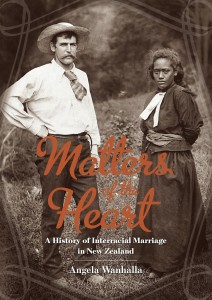 CROCC member Dr Angela Wanhalla was awarded the Ernest Scott Prize for History. This prize is awarded annually to the book judged to be the most distinguished contribution to the History of Australia or New Zealand or to the history of colonization published in the previous year.
CROCC member Dr Angela Wanhalla was awarded the Ernest Scott Prize for History. This prize is awarded annually to the book judged to be the most distinguished contribution to the History of Australia or New Zealand or to the history of colonization published in the previous year.
Matters of the Heart: A History of Interracial Marriage in New Zealand was published by Auckland University Press.
As the judges commented “Angela Wanhalla’s ground breaking history of interracial relationships in New Zealand across two hundred years utilises not only the usual range of church and state records but also personal papers, family and local histories to track the lives of couples whose relationship was sustained over a period of time. While Maori women left little trace for the historian, Wanhalla uses analysis of images, particularly photography, to overcome some of the gaps and silences in the record. She takes a broad view of coupling which incorporates common law relationships, Maori ceremonies and Christian marriages sanctioned by the State and also takes account of various debates and legislative action in relation to marriage over time.
“Wanhalla draws on the recent work by anthropologists and historians such as Ann Laura Stoler to explore the history of emotion and sentiment as central to these encounters. She historicises the specific context in which these are expressed and how they changed over time in relation to the society and demographics. She notes that interracial relationships in New Zealand have often been used as evidence of ‘gentle colonialism’ but while her study of intimacy makes an important contribution to overturning simplistic paradigms of race relations on the frontier and beyond, Wanhalla still emphasises the framework of gendered and racial power struggles within which these relationships operated.”
Congratulations to Angela for her ongoing success!
CRoCC member shortlisted for prestigious book prize
Congratulations to Angela Wanhalla, member of CRoCC and the University of Otago’s History Department, for the shortlisting of her recent book, Matters of the Heart: A History of Interracial Marriage in New Zealand, for the Ernest Scott Prize for History for 2014. This prize, given annually to the book judged to be the most distinguished contribution to the history of Australia or New Zealand or to the history of colonization, will be awarded at the upcoming Australian Historical Association Conference in Brisbane in July. Angela’s book was published by Auckland University Press.
Mary Boyd Prize
Congratulations to Tony Ballantyne of CRoCC in winning the inaugural Mary Boyd Prize for the best published history essay. The judges were Margaret Tennant (Massey) and Felicity Barnes (Auckland) and was awarded at the NZHA conference dinner at Otākou Marae on Thursday 21 November for his essay “On Space, Place and Mobililty in Nineteenth-Century New Zealand” in the New Zealand Journal of History April 2011.
Congratulations to Dr Angela Wanhalla
Great news for CROCC member, Dr Angela Wanhalla, for being awarded a Rutherford Discovery Fellowship to develop her research, “Marriage: The Politics of Private Life in New Zealand”. This award, administered by the NZ Royal Society, is designed to recognise, and help foster the careers of future research leaders. Since its inception in 2010 the RDF has been largely the preserve of scientists, so this is great news not just for Angela, the University of Otago, but also for the Humanities in New Zealand. Congratulations, Angela. Read the initial press release and more details on Angela’s project here

